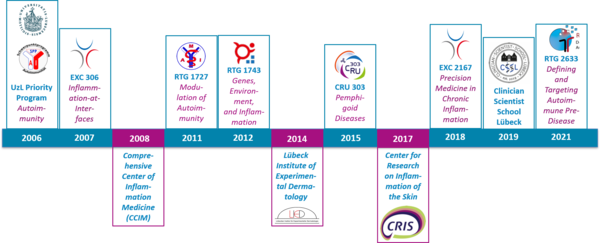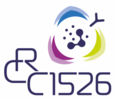Development of the CRC 1526
Successful Research on pemphigoid diseases at the University of Lübeck since 2004
The establishment of the CRC 1526 in the field of antibody-induced autoimmune diseases with a special focus on pemphigoid diseases (PD) is the consequent next step of a strategically planned development pursued by the University of Lübeck (UzL) over the last two decades.
Focused research on pemphigoid diseases started at the UzL in 2004 and was fostered in 2006 by the intramural funding of the research program "Autoimmunity".
In addition, the establishment of the Excellence Cluster (EXC) 306 "Inflammation-at-interfaces" in 2007 and its successor EXC 2167 "Precision Medicine in Chronic Inflammation" established in 2018, expanded the intensive research on PD to the Christoph-Albrechts-University (CAU) Kiel, which laid the foundation for the successful cooperation between groups at both campi and provided infrastructure for the research on pemphigoid diseases, including the Comprehensive Center for Inflammation Medicine, an interdisciplinary center which is specialized in multinational phase II/III clinical trials in the field of inflammatory skin diseases.
In 2014, the Lübeck Institute of Experimental Dermatology (LIED) was founded as a spin-off of the Department of Dermatology to strengthen the translational research on chronic inflammatory diseases in the skin.
The successful research on PD was further fostered in 2015 by the establishment of the Clinical Research Unit (CRU) 303 "Pemphigoid Diseases - Molecular Pathways and their therapeutic Potential", which focused on uncovering the mechanisms initiating effector cell recruitment of the skin and established novel pre-clinical models in adult mice. Furthermore, the CRU 303 also laid the foundation for the establishment of the Clinician Scientist School Lübeck in 2019 and played a central role in the establishment of the CRC 1526.
In 2017, the foundation for the realization of the Center for Research on Inflammation of the Skin (CRIS) was laid. CRIS is a research facility equipped with state-of-the-art technologies and core facilities that will provide optimal infrastructures for a research program dedicated primarily to pemphigoid diseases and ensure an optimized interplay between basic science and clinical research. After its completion, CRIS will be the central research facility for the research conducted by the CRC 1526 consortia.
Since 2022 the CRC 1526 will continue the successful research on PD at the campus of the UzL and CAU Kiel and extend its research to the campi of the Friedrich-Alexander-University (FAU) Erlangen-Nürnberg; Julius-Maximilians-University (JMU) Würzburg and the Max-Planck-Institute (MPI) for Heart- and Lung Research in Bad Nauheim
Early-career support
Promotion of young scientist is the cornerstone of every successful research project and one of the central key objectives of the CRC 1526 and its predecessors. Indeed, several members of the CRC 1526 were initially trained as PhD candidates, and MD students in one of the following programs:
Support and training of young aspiring scientist has been fostered at both campi by the research training groups (RTG) 1727 "Modulation of Autoimmunity" (2011-2020) and RTG 1743 "Genes, Environment, and Inflammation" (2012-2021) and continues today by the RTG 2633 "Defining and Targeting Autoimmune Pre-Disease" (UzL), the RTG 2501 "Translational Evolutionary Research" (CAU Kiel), the Life@FAU (FAU Erlangen-Nürnberg), Graduate School of Life Science (JMU Würzburg) and International Max Planck Research School (MPI for Heart and Lung Research).
Furthermore, in 2019 the Clinician Scientist School Lübeck (CSSL) was established to ensure the excellent training of young clinician scientist at the UzL and support them at the beginning of their career.
The successful training of young scientist will be continued and fostered by the CRC 1526, ensuring their excellent training and strengthening the research on autoimmune diseases!







